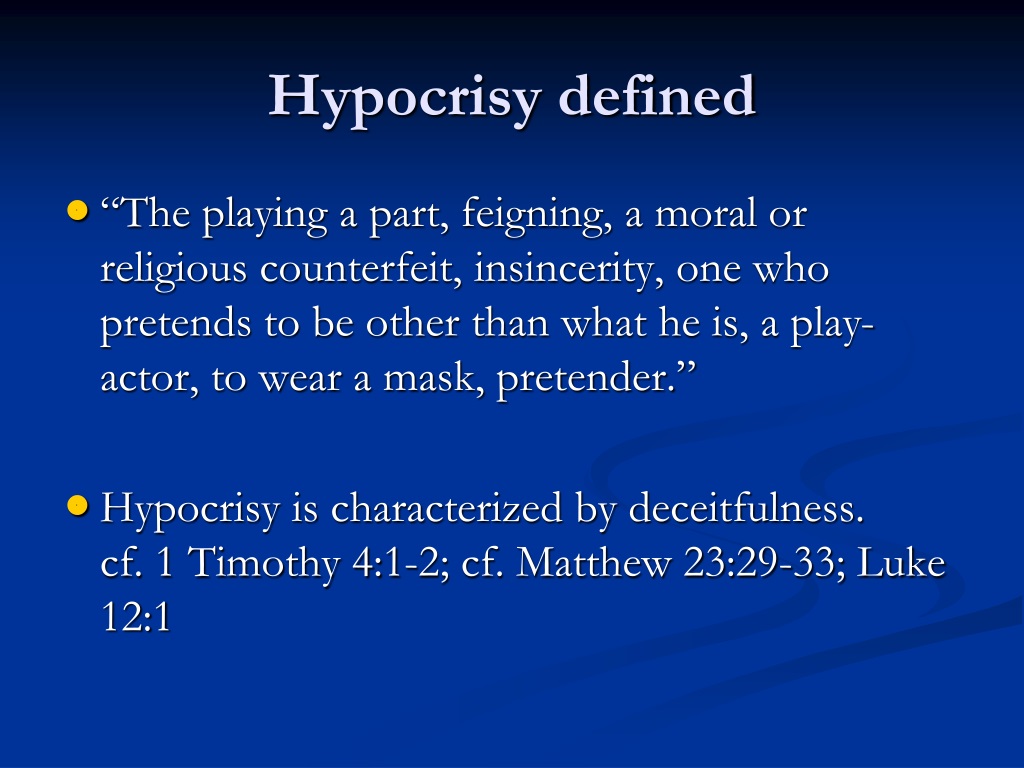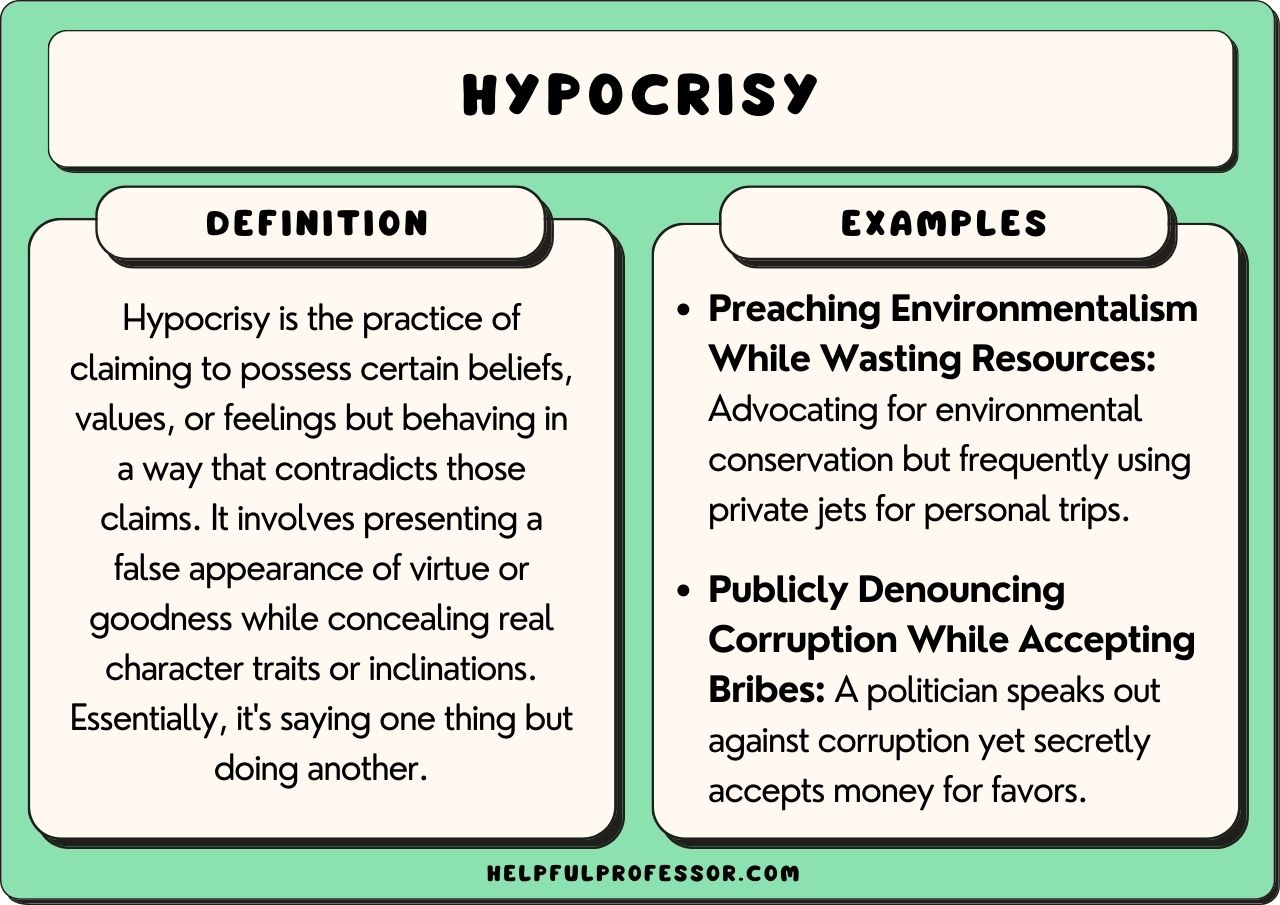Hypocrite Meaning - What It Really Means
Words, you know, have a way of carrying a lot more than just their simple letters. Some words, in a way, carry a real weight, a kind of feeling that hits you right when you hear them. "Hypocrite" is one of those words, a term that, you know, often points to something we find a bit off, something that just doesn't quite sit right with us. It's a word that describes a particular kind of behavior, a way someone might act that seems to go against what they say they believe or what they tell others they stand for.
People often wonder about the true nature of this word, how it's used, and what it really gets at when we use it in everyday talk. Is it always a bad thing to be called this? Can only people be described this way, or can other things, like even sentences, carry this kind of meaning? These are the sorts of questions that, you know, pop up when someone tries to get a better handle on the full scope of the term.
So, we're going to take a closer look at what "hypocrite" truly means, exploring its different uses and what it feels like when someone is, well, acting in a way that just doesn't add up. We'll explore the common ideas around it, and perhaps, you know, clear up some of the questions people have about this very specific word and its place in our language.
Table of Contents
- What is the Core Hypocrite Meaning?
- Is "Hypocrite" Always Negative?
- How Do People Show Hypocrite Meaning?
- Can Something Else Have Hypocrite Meaning?
- Understanding Hypocrite Meaning - Noun or Adverb?
- What About Slang for Hypocrite Meaning?
- What's the Real Hypocrite Meaning?
- What is the true hypocrite meaning?
What is the Core Hypocrite Meaning?
When we talk about the basic idea behind the word "hypocrite," we are, in a way, pointing to a person who acts in a manner that doesn't match what they say. It's a noun, you know, a word that names a person. This person, in essence, shows a kind of contradiction in their actions compared to their words. For instance, they might tell everyone that a certain thing is wrong, but then they go and do that very same thing themselves. It's a disconnect, you know, between what is spoken and what is actually done. This idea of a self-contradiction, where someone's outward claims don't line up with their actual conduct, is pretty much at the heart of what the word aims to describe. It's like they're presenting one picture to the world, but their true colors, or their true actions, are painting a rather different scene. So, it's about a person who, more or less, lives by a different set of rules than the ones they preach.
Is "Hypocrite" Always Negative?
People often ask if the word "hypocrite" always carries a feeling that isn't good. The simple answer is, you know, yes, it generally does. In English, when someone calls another person a "hypocrite," it's certainly not meant as a compliment. It brings with it a sense of judgment, a feeling that the person being described has done something that is not quite right or honest. For example, if a woman says she will never, ever care for anyone in a romantic way, but then she goes and gets married, some might point to that as a contradiction. However, the word "hypocrite" itself usually points to a deeper kind of dishonesty, a pretense. It's not just about changing your mind or doing something unexpected. It's about a deliberate act of pretending to have certain beliefs or feelings when, you know, you really don't, especially when you're using those stated beliefs to judge others. So, it carries a sense of disapproval, a clear sign that the speaker sees a flaw in the person's character or actions. It's a word that, in a way, highlights a lack of genuine behavior.
How Do People Show Hypocrite Meaning?
People show what the word "hypocrite" means through their actions, especially when those actions don't line up with their stated opinions or feelings. Think of it like this: a person might speak very loudly about the importance of being kind to everyone, but then, you know, they treat someone else with great disrespect. That kind of behavior, where the words and the deeds are so far apart, is a clear example of someone showing the hypocrite meaning in their daily life. Another way this shows up is when someone criticizes another person for doing something, only to then go and do that very same thing themselves. It's like they're holding others to a standard they don't apply to themselves. So, it's about a person who, in a way, puts on a show, pretending to have certain beliefs or feelings that aren't truly there, and then their actions give away the real story. This discrepancy, this difference between what is said and what is done, is how the idea of a hypocrite becomes quite clear in a person's behavior.
Can Something Else Have Hypocrite Meaning?
It's interesting to consider if only people can show what the word "hypocrite" points to. You know, it turns out that sometimes, even things that aren't people can carry this kind of meaning, too. For instance, sentences themselves can be described as hypocritical. How does that work, you might ask? Well, a sentence could be structured in such a way that it makes a claim, but then, you know, a part of that very same sentence, or another sentence right next to it, completely goes against that claim. It creates a kind of internal contradiction, where the words themselves don't quite agree with each other. This is less about moral pretense and more about a logical inconsistency in the way ideas are presented. So, while the most common use of the word "hypocrite" is for a person, it's worth noting that the core idea of contradiction, of saying one thing but having something else be true, can, in a way, extend beyond just human behavior. It's about a lack of consistency, which can appear in many forms, even in the way we put words together.
Understanding Hypocrite Meaning - Noun or Adverb?
When we talk about the word "hypocrite," it's important to know that it's a noun. This means it's a word for a person, a place, a thing, or an idea. In this case, it names a person who acts in a certain way. For example, you might say, "He is a hypocrite." This sentence, you know, tells us that the person always acts in that particular way, that it's a part of who they are. Then there's "hypocritical," which is a different form of the word; it's an adverb. Adverbs, you know, describe how something is done. So, you might say, "His actions were hypocritical," meaning the way he acted showed that quality. There isn't, you know, a difference in the basic idea they convey, but the way you use them in a sentence changes. One describes the person, and the other describes how something is done. So, while both point to the same core idea of contradiction, they fit into sentences in, you know, slightly different spots depending on what you want to emphasize.
What About Slang for Hypocrite Meaning?
It's quite interesting to see how the idea behind the word "hypocrite" shows up in different languages, sometimes even in informal ways. For example, in Filipino, people might use the term "plastic" or "plastik" as a kind of slang for a hypocrite. This is, you know, a rather common way to describe someone who isn't being genuine, someone who puts on a false front. When someone says "ang plastik niya," it roughly translates to something like, "what a hypocrite." This shows that the core idea of pretense, of not being real, is something that people everywhere recognize and have ways of talking about. It's a way of saying that someone is, you know, not authentic, that they are presenting a false image to the world. So, the concept of the hypocrite meaning, this idea of someone who isn't true to themselves or to others, finds its way into everyday speech, even with different words that capture that same feeling of inauthenticity.
What's the Real Hypocrite Meaning?
At its very heart, the real "hypocrite meaning" points to a person who pretends to have certain beliefs, certain ways of thinking, or certain feelings when, you know, they really do not. It's about a kind of deception, not necessarily a lie in words, but a lie in how one presents oneself. An example that really helps to make this clear is a person who says one thing but then does something else, often the complete opposite of whatever they were, you know, criticizing someone else for. For instance, a politician might speak about the importance of being honest and then, you know, act in ways that are far from honest. This kind of behavior, where there's a big gap between what is claimed and what is practiced, is what the word is trying to capture. It's about a lack of sincerity, a kind of performance where the person is acting a part rather than being truly themselves. So, it's about someone who, in a way, puts on a mask to appear a certain way, while their true self or their true actions tell a different story.
What is the true hypocrite meaning?
The true "hypocrite meaning" really gets at the idea of someone who lacks genuine character, someone whose outward presentation doesn't align with their inner state or their actual actions. It's about a person who, you know, might speak with great conviction about certain values, but then their own life shows a complete disregard for those very values. This contradiction, this split between what is said and what is done, is what makes the term so potent. It's not just about making a mistake or changing your mind; it's about a deliberate act of putting on a front, of pretending to be something you're not, especially when that pretense is used to judge or influence others. So, it's a word that, you know, captures the essence of someone who is not living with integrity, someone who is, in a way, living a double life in terms of their principles and their practices. It describes a person who fails to practice what they preach, showing a kind of moral inconsistency that many people find quite unsettling.

Hypocrite Meaning: What Is A Hypocrite? • 7ESL

PPT - Hypocrisy PowerPoint Presentation, free download - ID:9619134

18 Hypocrisy Examples (2025)